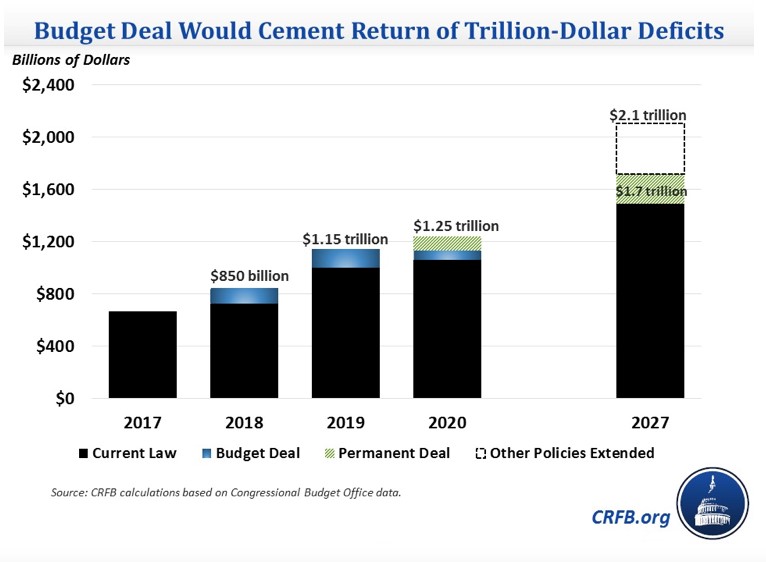As Washington scrambles to pass a proposed $1.3-trillion spending bill before another government shutdown, it’s about much more than footing the bill for a border wall and Dreamers—it’s about pushing the deficit over $1 trillion—forever.
Another round of spending bill talks closed on Tuesday morning with Republicans hoping to unveil the bill late on Tuesday, vote in the House by Thursday, and have the Senate pass it by midnight on Friday.
The bill would keep the government funded until the end of September.
But as it stands, disagreement continues to rule the day, with one GOP lawmaker telling the Hill on Tuesday morning that “It’s just a mess.”
The spending issues are highly divisive, ranging from funding for the border wall and protection for Dreamers to healthcare, the military—and even a rail tunnel between New Jersey and New York City.
On Sunday, talks broke down over border wall spending when Trump sought $25 billion in taxpayer money to build the wall, promising only two-and-a-half years of protection for Dreamers for Democrats in return. Democrats rejected that, and now, Republicans are demanding at least $1.6 billion just to start border wall construction, plus another $1.6 billion to boost immigration enforcement.
The $900-million for the $30-billion Gateway project, which would build a rail tunnel connecting New Jersey and New York City, is also an item of contention. The project is supported by Democrats and some Republicans, though Trump had threatened to veto it if it showed up on the spending bill. Related: ‘Data Is King’: The Oil Industry’s Next Most Valuable Resource
The new spending bill—if it ever sees the light of day—would boost spending for the Pentagon and domestic programs by $143 billion for fiscal year 2018, and $400 million in cybersecurity protections. That would include an $80-billion boost for the Pentagon to reward GOP defense hawks, plus some spending increases that Democrats had been lobbying for unsuccessfully under Obama.
Democrats may get billions of dollars to fight the American addiction to opioids, strengthen school safety and treat the mentally ill. Additionally, bipartisan funding of $3 billion may go to medical research at the National Institutes of Health—making for a record increase in funding for this outfit.
The IRS may get a boost, too.
What hasn’t come up on the partisan agenda is the U.S. budget deficit--and the clear skirting of basic math, which says that major tax cuts cannot easily coincide with the biggest increase in spending in recent years.
According to the Committee for a Responsible Federal Budget (CRFB), the U.S. is now staring at the abyss of a permanent trillion-dollar deficit.

(Click to enlarge)
If passed this week, the spending bill would cause debt to rise to 99 percent of GDP by 2027. “But if made permanent, debt would rise to 105 percent of GDP in 2027”, the CRFB said.
“With other tax provisions extended permanently, debt would reach 109 percent of GDP, higher than the previous record of 106 percent of GDP set just after World War II.”
By Fred Dunkley for Safehaven.com
More Top Reads From Safehaven.com:
















